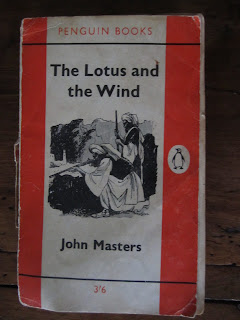I bought this to goad myself to read something that I wouldn't normally choose - to extend my horizons - and, to my surprise, I enjoyed it a lot. It is set in the 19th century in India, Afghanistan and the Middle East and is vaguely John Buchanesque. It tells the story of an English spy, his Gurkha orderly and their Russian enemies, the Muralevs. The English spy, Robin Savage, is a Hurt Locker kind of guy, unable to remain at home for long, desperate to nick off every five minutes to search the world for truth, or follow his dream, or something – Masters gets a bit too misty-eyed about this aspect of Savage's character for my taste. Savage, despite the fact that 'to him men and women were scarcely more comprehensible than fish', falls in love, which creates some conflict with his wandering instincts, and the novel also charts the development of his relationship with Anne, the girl who loves him.
Masters is brilliant at vivid descriptions of wild places and his plot is exciting (although, as always with stories involving spying, I never really understood very clearly what exactly was going on and who was doing what where or why). Some of the settings are surprisingly topical – 'Basra had the worst reputation of any city in the Middle East' - and the treatment meted out to their horses by some Mongols that Robin encounters – '... they all trooped out into the street, unsaddled one among their horses, slashed its throat, and together attacked the carcass with their knives. In an unbelievably short space of time they returned, carrying huge, bleeding chunks of meat. The disembowelled horse, slashed to ribbons, lay in the middle of the street. In the eating house, they threw the meat on the floor' – makes the current controversy in Australia about the treatment of cattle exports pale somewhat.
Masters's characterisation is the equal of his scene setting. Given that the book is in many ways quite 'Boy's Own', it is pleasant to discover that he seems to be as interested in the women he creates as he is in the men. He shows considerable perception in his description of the way that Anne comes to terms with Robin's strange personality. He is also sympathetic towards a character who is considered a 'fast woman' but who, he reveals, has a husband who is a homosexual, which is a subject that I thought was not usually mentioned in fiction at the time the book was written - in the 1950s. My favourite though of his characters is a man, an officer called Hayling, who has a hook in place of the hand he lost in battle and who practises a kind of courtly love towards Anne.
Just as Hayling is essentially a romantic figure, so there is a great deal of romanticism in Masters's conception of Robin. Sadly, as I said already, I find this aspect of the novel difficult to accept. Robin's odd rivalrous relationship with Muralev is peculiar and, although it is meant to be vaguely mystical, suggests the possibility of suppressed impulses, on Robin's side at least. Similarly, Robin's resistance to sex seems virtually unbelievable and his final capitulation made me squirm:
'He ripped of the sheet and heard the fearful ecstasy in her cry - 'Robin!' He sprang on her fierce as a hunter at her shriek. She struggled with him all night, with teeth and nails and flesh, until in the first light she fell back, open-mouthed, bleeding, insensible, and triumphant.'
According to Wikipedia, Masters has been accused of racism but nothing in this novel suggests anything of the sort. By far the most heroic and intelligent figure in the book is actually Jagbir, Savage's orderly, a Gurkha. While characters from other cultures and nationalities appear often, they are portrayed not as hateful or bad but merely other. They are never criticised for being what they are and coming from where they do. They are simply portrayed as they are, as perceived from within the culture Masters comes from. Their cultures are respected, without being embraced at the expense of the culture from which the narrator comes.
My copy of The Lotus and the Wind bears a positive quote from Angus Wilson, which I would not have predicted. This is what he had to say:
'A very impressive writer. He organizes and controls the swift-moving, exciting narrative of his novel with the unobtrusive brilliance of a first-class military strategist'.
I suspect Wilson thought he was damning with faint praise - military strategy, one might think, reading between the lines, is not what the great writers of the world deploy, but blinding talent. Nevertheless, I think he was right about Masters, although the insult, if that is what it was, does not work. Masters set out to provide entertainment with something thought provoking about the strangeness of being human at its core, and he succeeded very well.

No comments:
Post a Comment